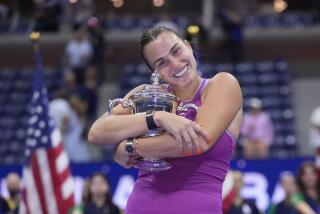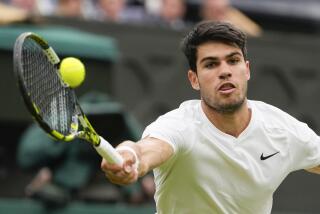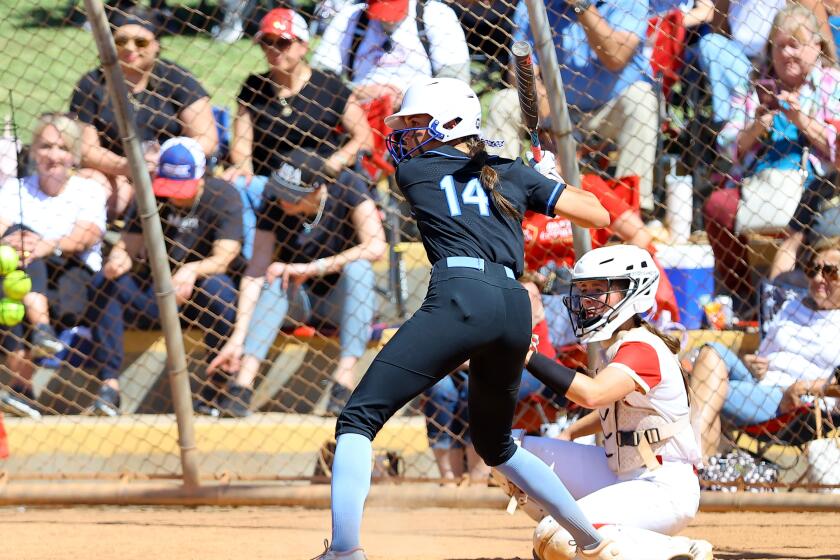Guess Who’s Back in U.S. Open Final
- Share via
NEW YORK — Conventional wisdom held for months that Jennifer Capriati was the only one who could realistically slow the runaway success of sisters Venus and Serena Williams.
Instead of getting ready to stop the sisters, Capriati, eliminated in the U.S. Open quarterfinals, was dancing at a club, Serafina, at a weekly Candyland party, landing in the tabloids, having stripped down to her bra, cigarette in hand.
Those with more conventional weapons in hand--a racket--fared slightly better at the Open on Friday, but, by nightfall, a certain sameness settled in over the National Tennis Center. Tonight will be another all-Williams final, the fourth in the last five Grand Slams, and a repeat of last year’s glitzy meeting in prime time.
Two-time defending champion and No. 2-seeded Venus had more difficulty, defeating No. 10 Amelie Mauresmo of France, 6-3, 5-7, 6-4, in 1 hour 58 minutes. She had three aces and double-faulted 10 times.
Her younger sister, No. 1 Serena, stalled in the second set, fighting off three set points, but finished strongly against No. 4 Lindsay Davenport, winning, 6-3, 7-5, in 1 hour 22 minutes. Serena, who served 13 aces, will be attempting to win her third consecutive Grand Slam title, which would equal Steffi Graf’s accomplishment in 1996.
“Most amazing thing in sports almost,” Davenport said. “Could you imagine Tiger Woods challenging a sibling to go head to head for all the majors? And in an individual sport, no less. They don’t have teammates to help them along.”
The sisters have been able to establish a sense of separateness. For all that, it was fascinating to watch how each of them dealt with adversity on the court in relatively similar fashion in the semifinals.
Example No. 1: Venus, suffering from a blister on her right hand, found herself in a tight third set against an inspired Mauresmo. Serving for the match at 5-4, Williams fell behind, 0-40. She equalized by hitting a service winner of 116 mph and an ace of 114 mph, on two of the three points. For an exclamation mark, Williams reached match point by firing a service winner of 122 mph.
Example No. 2: Davenport slowly started to find her range, took a 5-2 lead in the second set and served for it at 5-3. Serena broke her at 15, and fought off three set points in the 10th game, trailing, 4-5. She saved one with an ace, another with a service winner and the third with a forehand winner.
“That was incredible playing at a tight time,” Davenport said. “I wish I had been able to serve a little better of a game. She just came up with some big serves at the right time the whole match, and a really big game to just hang in there in the second set.”
Venus simply looked weary and slightly annoyed when asked whether the sisters’ domination was good for the sport.
“To be honest, I don’t see why the question could be relevant why it would be bad for tennis,” she said. “It’s never been asked before. So I don’t understand the question.
“It’s just hard these days. When you win, there’s a problem. When you lose, there’s a problem. So what do you want me to do?”
She emphasized her point by smacking her hand on the podium. Venus was not the only puzzled member of the family. The crowd support was surprisingly in favor of Mauresmo. It would be like a crowd at Roland Garros cheering Mauresmo’s double faults in a match against an American.
“I felt the crowd was getting behind me and maybe appreciated the way I was handling things,” Mauresmo said. “I could feel that. It was great, actually, to play an American and feel the crowd is behind you. That’s a pretty good effort.”
Said Oracene Williams, the mother and coach of Venus and Serena: “You know what’s wrong, you can surmise that for yourself. There were some people pulling for Venus. I give them a little benefit of the doubt. That’s part of the game. It was worse in California [Indian Wells].”
At Indian Wells last year, the Williamses charged racism when the fans booed the family during Serena’s final against Kim Clijsters. The fans were upset after Venus withdrew about five minutes before her semifinal with Serena because of an injury.
Oracene was asked whether Friday’s reaction was a racial issue or one of gender.
“I’ve been thinking about that, I think that’s it ... Is it because these are women, and women can’t have power?” Oracene asked. “No matter what the race is, it’s a problem in American society.”
The sisters simply answer by winning matches at an astounding rate. They have combined to win seven of the last 11 Grand Slam titles. Venus won the U.S Open last year in straight sets against Serena, and Serena beat her in the French Open and Wimbledon finals this year, also in straight sets.
“I was overconfident going into that match,” Serena said of the 2001 Open. “I was like, ‘Oh, I’m playing well, beat Martina Hingis and Lindsay Davenport.’ You know, I was overconfident, not focused enough.
“This year’s totally different. Venus is playing great. She’s been playing great all this summer. So I know she might maybe have a little bit of an edge going into this match, so I’m not overconfident at all.”
*
(BEGIN TEXT OF INFOBOX)
Sibling Rivalry
Not once in the 20th century did siblings meet to decide a Grand Slam title. It’s about to happen at a third consecutive major, and for the fourth time in five majors as Venus Williams plays Serena:
*--* YEAR TOURNAMENT WINNER 2002 U.S. Open Today 2002 Wimbledon Serena 2002 French Open Serena 2002 Australian Open Capriati* 2001 U.S. Open Serena
*--*
*Jennifer Capriati defeated Martina Hingis in the final; Venus lost to Monica Seles in the round of 16; Serena did not play because of ankle injury.
More to Read
Go beyond the scoreboard
Get the latest on L.A.'s teams in the daily Sports Report newsletter.
You may occasionally receive promotional content from the Los Angeles Times.











